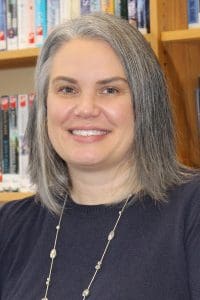Mandy Travis always knew that she was going to end up at Syracuse University for grad school.
After all, her brother graduated from the Newhouse School of Public Communications, and her mom worked in the SU housing office for most of her life growing up. In high school, she’d even volunteer to take ID pictures in the Carrier Dome.
But there was one small dilemma.
After getting a degree in education and briefly spending time teaching social studies and history, she didn’t actually know what she wanted to go to grad school for.
One day she was sitting with her friend in their living room when they started talking about graduate degrees in librarianship.
At first, Mandy had no idea that was something you could actually pursue. But over time, the idea became more and more appealing to her.

Mandy Travis G’02
“When I looked at what different parts of my life had in common, it was that I always ended up at the library,” she said, “I realized that maybe I actually wanted to be a librarian!”
That’s when she decided to apply for the MLIS program and start her journey at the iSchool.
Mandy initially enrolled as a School Media specialist, but after taking IST 511 — a gateway course that introduces students to the various professional pathways one could pursue — she fell in love with the idea of public librarianship.
“The public library wasn’t something I had ever considered,” she said, “but I saw that you had so many different outlets. You can do children’s, teen’s. You could be in reference. You can even do PR!”
The tight-knit community of professors and students at the iSchool supported each other as they continued to learn what it means to be a librarian in today’s rapidly evolving world.
Mandy noted that everyone in the cohort was so different in terms of their background and the direction they wanted to take in their career. That meant they could lean on each other’s strengths and constantly find new ways to engage with what they were learning in the classroom.
(This included frequent discussions about the character of Rupert Giles, a school librarian in Buffy the Vampire Slayer.)
“The experience I got was really learning who I was, what my possibilities could be, and that I should always be reaching higher,” she said.
Nearly 20 years later, now serving as the Director of the Northern Onondaga Public Library in the midst of COVID-19, Mandy is learning how to draw on her experiences at the iSchool and in her career to adapt and serve the surrounding community.
She draws a lot of similarities between the Great Recession and everything that’s happening now. In 2008, people discovered just how valuable libraries are in times of need.
“They realized it’s not just books,” she said, “It’s the same now.”
Through new digital programming and a lot of promotion around their digital services, the Northern Onondaga Public Library is challenging the notion that you have to come to the library to be a library user. It’s been a success so far, and Mandy reports that the huge surge in access to digital resources is continuing even as the library reopens its physical locations.
Still, this year hasn’t come without new and unique challenges for everyone. From concerns over public health to increasing civil unrest, the library is taking its perception as a trusted place seriously. And for Mandy, that means anything but being neutral.
“Everyone says we shouldn’t take sides. It’s not about sides,” she said, “It’s about offering a safe place, whether virtual or in person, to have conversations about racism, politics, and mental health.”
She says the library is grappling with how to offer those spaces for people to come together and discuss relevant topics. Then the challenge is figuring out how to push that out into the community in order to make a difference.
Right now, Mandy says her job as Director is to bring a positive energy while remaining involved in these bigger issues, and she encourages people regardless of their roles and beliefs to view things with empathy and positivity. It’s these attitudes that make people feel that they have the support they need to get the job done.
“It lets people know that they’re not alone.”
